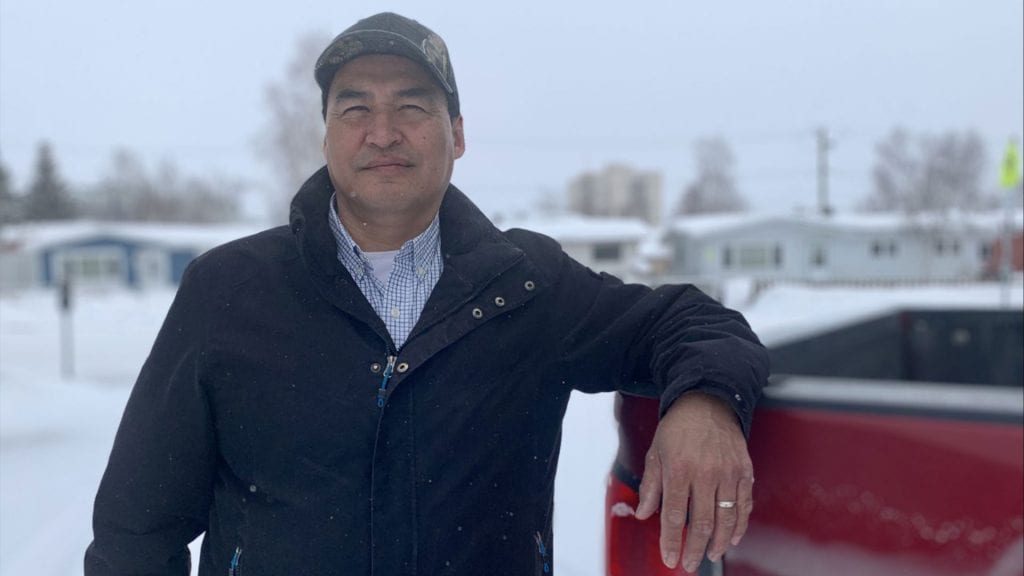
Floyd Bertrand, a member of Acho Dene Koe First Nation (ADKFN) challenged chief and council’s decision to postpone an election. Photo: Charlotte Morritt-Jacobs/APTN.
A federal court judge has ruled in favour of a dene man who took his First Nation to court over a postponed election.
Floyd Bertrand, a member of Acho Dene Koe First Nation (ADKFN), and former chief, legally challenged chief and council’s decision to postpone an election.
He argued the band was operating under a faulty set of election rules, which in turn, did not allow chief and council to extend their terms in office.
“It just goes to show how important band member’s voices are. I feel happy with the decision the federal court judge made,” Bertrand said.
ADKFN government buildings and roughly 550 members reside in the hamlet of Fort, Liard, Northwest Territories.
APTN News visited the community in September 2020 after a string of resolutions were passed by leadership to postpone a regular election for chief an council scheduled for June 8, 2020.
“We wanted an election but the chief and council took a regulation that didn’t apply to us and used it for their extension which they didn’t have the authority to do,” Bertrand told APTN.
Chief and council justified postponement and extension of their terms in office by citing authorization to do so under the First Nations Election Cancellation and Postponement Regulations.
This was a temporary regulatory option under the Indian Act and the First Nations Election Act, which came into effect April 8, 2020 and was slated as a means of protecting the health of Indigenous communities during the COVID-19 pandemic.
But the First Nation is not governed by Indian Act on regulations pertaining elections, something Federal Court Justice Sébastien Grammond acknowledged in his court ruling on April 1, 2020.
“Acho Dene Koe’s customary law requires elections to take place every three years and does not authorize the council to extend its own term of office,” Grammond wrote.
Watch Charlotte’s story here:
The judge also rejected arguments made by the First Nation that under self-government they were in the right to decide on how to approach election customs.
Grammond noted “where First Nations have not enacted positivistic laws, self-government manifests itself through the broad consensus of the community.”
Bertrand argued in court that chief and council did not seek any input from membership, even as community members talked amongst themselves on the possibility of holding an outdoor election to mitigate risks of social gathering during the pandemic.
“The most important thing was that the First Nations band members were never consulted or asked about ‘would you like to postpone the election for another six months due to Covid-19 concerns?’” Bertrand said.
The ruling may set a precedence for other First Nations whose elections have been impacted by the Covid-19 pandemic.
For that reason, the case received support from national not-for-profit group The Band Members Alliance and Advocacy Association of Canada (BMAAC).
“Because there are a number of other similar cases across Canada where chief and council have unilaterally extended their term in office relying on these regulations, the implications are far reaching and the court agrees with us,” said Rob Louie, BMAAC president.
The group who works with First Nations in cases of alleged corruption, held intervener status and made arguments in the case.
“We also argued that band members were entitled to be consulted pursuance to the doctrine of procedural fairness. In this case we were saying that band members should have been notified that council was considering extending their time in office and consulted.”
APTN repeatedly reached out to chief and council but were unsuccessful to secure comment by the time of publication.
ADK is scheduled to hold an election on April 26.
Feds to appeal ruling
The federal government said Thursday that it will appeal the Grammond’s decision.
According to Indigenous Services (ISC) Minister Marc Miller, the law to postpone elections was brought into effect to protect communities from the spread of COVID-19.
To date, according to ISC, 116 communities have used the act to bridge the gap between elections, “36 of these hold elections under the Indian Act; 15 under the First Nations Elections Act; and 65 under a community or custom process.
“The Government continues to recognize the health risks of holding elections during the COVID-19 pandemic, especially in at-risk, underserved Indigenous communities, and particularly as parts of the country contend with a third wave of COVID-19 and highly contagious variants. First Nations have used these Regulations as a key tool to help manage COVID-19 risks within their communities.
“It is in light of this context that we have made the decision to appeal this ruling.”










